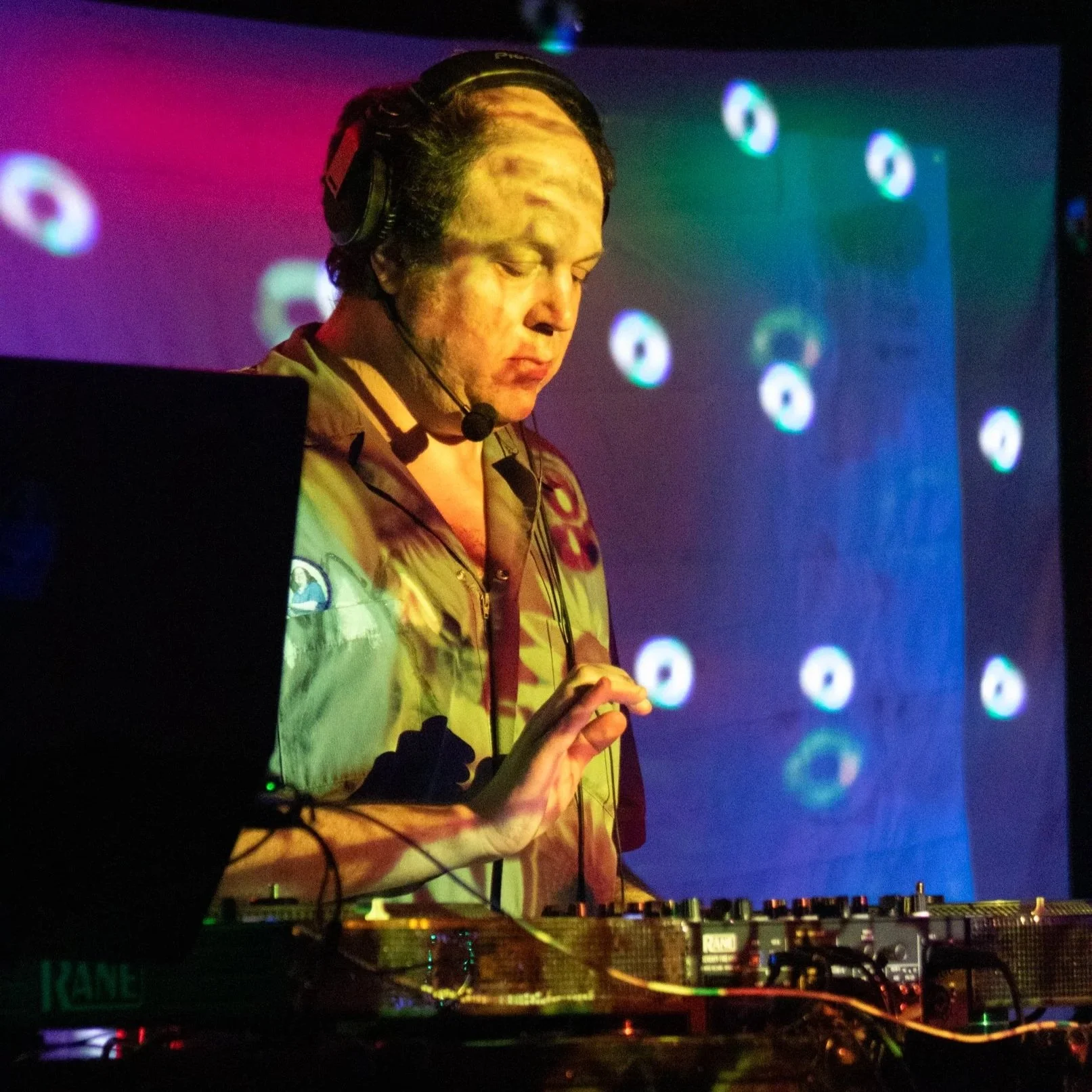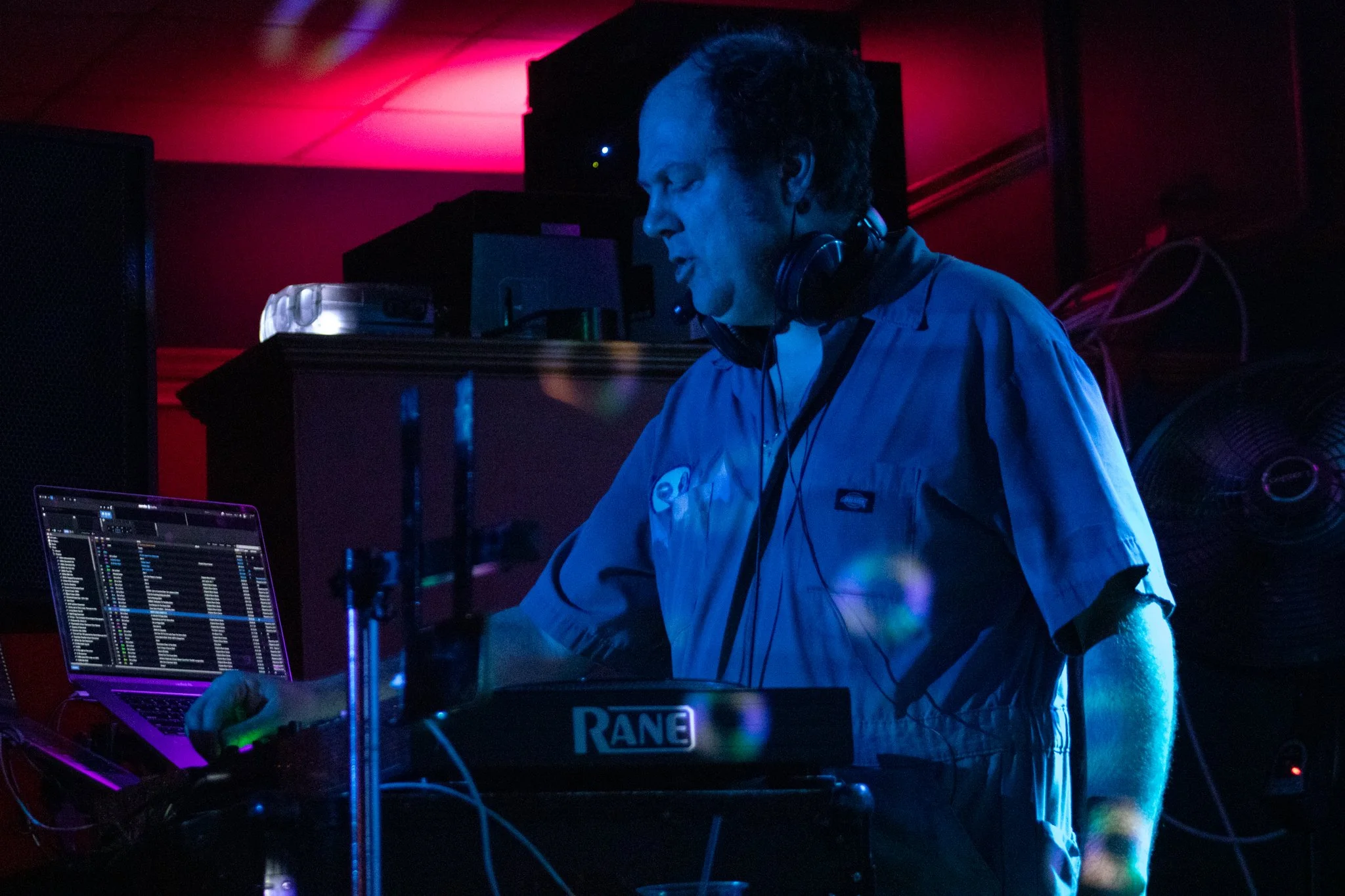DJ Barticus chooses music over everything
Photo Credit: Eva Ludke/The New Political
This article was published in The New Political’s 2025 Fall Print.
On a Friday night in the cleared-out and dimly but colorfully lit dining area of a “Mexican-inspired” restaurant, Micheal Bart aligned the headset microphone to his mouth as he shifted his gaze from his Rane turntable to the room of about 20 people below him. “Alright Casa, we’re just getting started here at 80s night, be sure to ask about their tacos. The inventor of the late-night taco is behind the bar tonight, John John John,” he said. To the instantly recognizable opening of The Talking Heads’ “Burning Down The House," those on the dance floor began to either sway or dance to the music. Everyone else remained clung to the walls or seated at the bar.
It was around 15 minutes into one of many dance parties that Bart, more commonly known in the Athens area as DJ Barticus, has been hosting for the last ten years. In addition to Casa Nueva, Bart DJs at The Union, Jackie O’s and The Side Bar. His sets typically consist of him spinning certain decades of music, such as this Friday’s 80s night.
Bart, dressed in a grey Dickies jumpsuit, transitioned with an air horn sound effect from “Burning Down The House” into “Safety Dance” by Men Without Hats. Just as the song’s first verse was about to begin, the sound cut out and the crowd let out a collective “No!” and a few began singing the song’s opening. Adjusting the wires connected to the front of his turntable, Bart promised the audience the sound would return quickly and, after a minute, it did, followed by cheers from the room.
The following week, Bart, now in a white Dickies jumpsuit, said, “[That] was a weirdly slow night. Little bummed that it wasn't busier, but everyone that was there was having a good time.”
Sat in his dark green-walled studio, he shuffled through a shelf holding part of his estimated 15,000 multi-genre and decade-spanning vinyl collection, eventually grabbing a Prince album. While placing the record on the turntable, he noted that there was a higher than usual number of DJ events that night before saying, “I guess I do worry, too, there's a weird thing that happened with Covid.”
Before the pandemic, Bart had been DJing for almost 20 years. In high school, he and friends would take turns scratching records on a turntable and—after coming to Ohio University in 2001 to study audio production—began to help host, promote and DJ in his roommate, DJ Ruckus Roboticus’ series of dance parties called Dance or Die. After graduating, he began working for AmeriCorps and Avalanche Pizza to stay in Athens while he took over as head of the Dance or Die parties from 2003 until 2008.
As the Prince record approached its end, he skimmed through a couple rows of records before picking up another and placing it on the DJ controller’s opposite turntable — maintaining the continuous quiet stream of music. “I choose music over everything else,” he said. “There’s a lot of things that just don't make sense, like I can never really work for a big corporation…but to get 100 people to all give me five dollars to see me DJ, that makes sense.”
During the pandemic, Bart turned to streaming on Twitch to continue DJing in the absence of in-person events. The unexpected community—mainly consisting of physical media collectors—he found has kept him on Twitch up until today. Every Thursday, Bart does a six-hour stream from 6 a.m. until noon; it starts so early so viewers and other streamers from different time zones can join.
Getting up from his chair, he switches his studio speaker’s audio from his turntable to his laptop, which he’s opened to Brazilian streamer’s DJ show. In order to truly be a part of the online community, Bart explained, he had to engage with others' streams as much as he streamed himself. As he typed and sent a five-dollar donation, Bart said, “Watch how much he loses his shit, he’ll say, ‘stop the music,’” Almost immediately, the man stopped speaking Portuguese and in English said, “Stop the music, stop the music, stop the music.”
Photo credit: Eva Ludke/The New Political
Liv Spencer, whose fully analog liquid light shows were previously a strictly in-person experience, moved their art to Twitch during the pandemic too. When Spencer joined one of Bart’s streams where he was inviting collaborators, they added the light show to his green screen. “That was our first interaction, we weren't even talking,” Bart said. “It was just creating together.”
Spencer had been living on the West Coast at the pandemic’s start but moved to Athens in early 2025 because of Bart’s enthusiasm for the town and its people. “He's a very valuable asset to this place,” they said. “He's really taking it upon himself to keep the community engaged, to keep love of music at the forefront…and these sort of gatherings and dance parties are all inherently political, and I see him blending the partying with social action and social awareness.” When Athens City Council passed a resolution calling for an immediate ceasefire in Israel and Palestine in 2024, Bart encouraged his in-person and online audiences to attend council meetings and support the activist groups organizing for the resolution’s passage.
In 2023, Bart was one of multiple DJs in Athens who were fired from local radio after the group Total Media purchased Athens’ WATH and WXTQ stations as a part of what he described as a “conservative takeover of the airwaves.” The live shows put on by local DJs were replaced with pre-recorded sets coming from Total Media’s main office in Jackson, Ohio, and the new ownership pushed for conservative politicians to be interviewed during the daytime slots. Prior to these changes, DJs were able to interact directly with the larger Athens community and could promote their upcoming in-person events to a wider crowd.
The impact of these local radio changes along with social impacts of the pandemic, Bart explained, has had noticeable impacts on the local music scene. Before, the attendees—who ranged from 18- to 60-year-olds and fell into various distinct sub-cultures—would pack his various 70s, 80s or Y2K dance parties full.
“A fun dance party, to me, is the intersection of a bunch of crowds…and I’m not seeing as much of that,” said Bart. “I don’t know if that's just an Athens thing, I think it's a world thing. Everything is getting so divisive and that's kind of how the fascists are able to grab power.”
Despite his appreciation and continued participation in the Twitch community he found, Bart explained nothing can compare to the in-person feeling of being a “mad scientist” who can’t “see individuals but…the entire room and all the faces and the energy and try[ing] to ride that wave.” Yet, with the crowds shifting and the fracturing of the in-person dance scene, he has begun to question if his time in Athens is coming to a close. For now, however, Bart plans to keep with what he has been for the last 20 years: doing the thing that makes most sense to him by keeping the records turning.
Photo credit: Eva Ludke/The New Political



